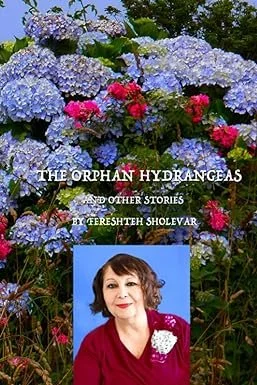The Orphan Hydrangeas and Other Stories
Parnilis Media
$15.00
You can purchase a copy here.
Special review by guest blogger, Robert Zaller
The multilingual Iranian- American poet and novelist Fereshteh Sholevar, long resident in the Philadelphia area and the recipient of numerous local and statewide awards, offers a moving and wide-ranging story collection in The Orphan Hydrangeas (Parnilis Media). Sholevar’s wide-ranging stories are set in various times and locales—Iran, Algeria, the United States—and deal eloquently with perennial themes—solitude, betrayal, persecution, love, and death. It is a world in which, as Sholevar notes in the brief tale, “The Cat Comes Back,” “All the lights of the universe have gone out.” Yet there is nothing in the stories that is lugubrious. Sholevar tells of tragedy with a light touch, with frequent sparks of humor and a Surrealist wit that make of her twists of plot and often unpredictable endings a banquet that keeps one coming back for more. Life, she suggests, isn’t set up to make sense, and death presides over it in the end.
Most frequently, Sholevar’s stories involve the relationship between individuals in which a stranger enters the protagonist’s life, transforms it, and mysteriously disappears. The confusion of who individuals are and what they represent is, for her, the central enigma of experience, from which all else follows. The “stranger,” however, often turns out to be the self, because division begins in the individual, and disappearance to be the wakening from a dream. Sholevar suggests that what we call ‘society’ is in its essential respects a projection of the personal dilemma into the hardened dogma of habit, rules, and institutions. It is here that cruelty and exploitation solidify themselves, creating the traps that ensnare the many, as in “The Guard,” where an orphanage, the pride of its town, serves as cover for a brutal pederast. But the reader is also cautioned against identifying too easily with the supposed victims of Sholevar’s stories, as in “The Watermelon,” in which a woman testifies to the physical and mental abuse she has endured at the hands of a cheating husband, only to confess casually at the end that she has killed him with blows from his favorite fruit.
Withal, Sholevar concludes—if there is a conclusion to be had—that, in the words of the possibly imaginary protagonist of “Sisyphus, I, and All That,” “It’s good to be alive. Suffering and beauty are what it’s all about.” Is the suffering worth the beauty, then? And are the two distinguishable?
Fereshteh Sholevar leaves us to figure that out for ourselves.
Robert Zaller, poet, critic, and historian, is a Distinguished University Professor Emeritus at Drexel University.

